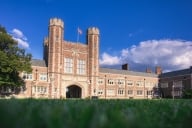You have /5 articles left.
Sign up for a free account or log in.
If campus technology officers have been feeling left out as their colleagues in the financial aid office get all the fan mail from Congress, never fear. Now it's their turn.
A bipartisan group of House of Representatives lawmakers said Wednesday that they had written the presidents of 19 colleges and universities asking their officials to complete an expansive survey on the use of their campus networks for illegal downloading of copyrighted music, video or other digital content. The institutions (all universities, a list of which appears at bottom) were singled out because they had received the largest number of copyright infringement notices from the recording and movie industries in the most recent reporting period.
The effort was spearheaded by lawmakers on the House Judiciary Committee, which has led Congress's scrutiny of the campus downloading issue so far. But the fact that the signers of the letter included the chairman and senior Republican on the House Education and Labor Committee suggested -- to the dismay of some college officials -- that leaders on the education panel might be receptive to dealing with the issue in legislation to renew the Higher Education Act this year.
"Your full and complete responses to the survey will assist us in determining what 'best practices' need to be instituted," the lawmakers write. "It will also help us to assess whether Congress needs to advance legislation to ensure the acceptable use of educational facilities to obtain or traffic in copyrighted goods is no longer associated with student life on some U.S. campuses."
Rep. Lamar Smith (R-Tex.), the top Republican on the House Judiciary Committee, added in a statement: "There is bipartisan agreement that if we do not receive acceptable answers, Congress will be forced to act."
The six-page survey (which starts on page 4 of this document) asks a wide range of heavily detailed questions and seeks a slew of documents about the institutions' policies and practices. The inquiries fall into four basic categories:
- Education: the campuses' policies on "acceptable use" of their networks and how they communicate and enforce them.
- Enforcement: how the institutions respond to copyright infringement notices and other violations of their acceptable use policies.
- Technology: what practices or policies they have in place to prevent misuse of their networks.
- Legal alternatives: the extent to which colleges promote "legitimate services as alternative sources for copyrighted materials."
"Universities have a moral and legal obligation to ensure students do not use campus computers for illegal downloading," said Smith. "These schools do not give away their intellectual property for free, and they should not expect musicians to do so." He added: "We want to know exactly what they plan to do to stop illegal downloading on their campuses."
In addition to Smith, the letter comes from most of the top members of the House Judicary Committee and Education and Labor Committee, including Rep. George Miller and Rep. Howard P. (Buck) McKeon, the California duo who are the Democratic chairman and senior Republican, respectively, on the education panel, and Reps. Howard P. Berman (D-Calif.) and Howard Coble (R-N.C.), who lead their respective parties on the House Judiciary Subcommittee on Courts, the Internet and Intellectual Property. Noticeably absent among the signatories, however, was Rep. John Conyers of Michigan, the Democrat who heads the full Judiciary panel; a call to his office asking why went unreturned.
The letter is the latest sign that members of Congress have locked arms with the entertainment industries to endorse a crackdown on student downloading of copyrighted material, which they argue is rife on campus networks. The House Judiciary Subcommittee on Courts, the Internet and Intellectual Property held a hearing in March at which lawmakers promised greater scrutiny if they did not see colleges get tougher on illegal downloaders. College officials sought both to show that they took the fight against copyright infringement seriously and to suggest that excessive intrusion could hamper the open dissemination of information that characterizes higher education.
The Government Accountability Office conducted a survey on illegal campus downloading last year, but a significant proportion of the scores of colleges surveyed declined to participate, because in a break with usual GAO practice, the survey did not promise confidentiality to the institutions queried.
The institutions that received the Congressional survey will have a thorny decision to make about whether to participate it. Because so few institutions were approached, failure to fill out the survey will be easily noticed. But providing all the information requested could put the institutions on record acknowledging practices that critics (in the House or in the entertainment industries) could see as falling short of what they think is sufficient.
And among those watching, clearly, will be leaders in the entertainment industries, who followed the news release from the House members, in very short order, with one of their own praising the survey.
“Illegal file-trafficking is a shared problem for the entertainment industry and universities alike,” said Mitch Bainwol, chairman of the Recording Industry Association of America. “We recognize the many pressing issues facing administrators today, but we cannot afford to turn a blind eye to theft on such a massive scale. After extensive hearings and inquiry, members of Congress are right to expect answers. We welcome this effort to document the commitment and resources that universities are putting forth to address this problem.”
The universities that received the letter are:
- Boston University
- Columbia University
- Duke University
- Howard University
- Michigan State University
- North Carolina State University
- Ohio University
- Purdue University
- Rochester Institute of Technology
- University of California at Los Angeles
- University of Massachusetts at Amherst
- University of Massachusetts at Boston
- University of Michigan
- University of Pennsylvania
- University of Nebraska at Lincoln
- University of South Carolina
- University of Tennessee
- University of Wisconsin at Madison
- Vanderbilt University









